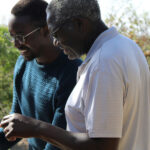In this article, I hope to convey something to you of my grief and gospel hope. I’ve experienced a minister being caught in a disqualifying sin at various degrees of proximity and in various ministry contexts. It happens often enough that, as ministry leaders, we need to be equipped to respond wisely and through the lens of the gospel. Yet often we aren’t, and we offend the glorious name of Christ in our feeble attempts to defend it.
Often we offend the glorious name of Christ in our feeble attempts to defend it.
In many ways, we will not be ready. How can we be? Though only Christ is our great high priest (Hebrews 4:14-16), perhaps because God is pleased to reveal himself to us through the ministry of men of flesh and blood, it is so painful to us when they fall. Nonetheless, to serve Christ and his church, we must be prepared, even if not ready, to respond to the reality of disqualifying sins.
A few comments on what this article is not saying. I will not presume here that disqualifying sin is sexual sin. It may be, but it is not necessarily. Nor will I comment on the restoration of ministers. This article is solely focused on how you should respond in the moment to any minister caught in disqualifying sin, particularly if you are a minister in that church. I earnestly hope that avoiding these mistakes will help you to comfort and carry Christ’s church through the pain and suffering, with an appropriate mixture of grief and gospel hope, that God might be glorified.
1. Not Being Impartial
When we discover disqualifying sin, we sometimes tend toward partiality. In our African context, we often hesitate to challenge ministers, viewing them as holy in some way, or as being above reproach in the sense that we cannot confront them on any issue of sin. A healthy respect for our ministers is good, and we’ll speak to this in our next point. Still, we must recall that Christ alone is without sin.
Christ alone is without sin.
It may be startling to you if you have not experienced this first-hand—but often we hesitate to ask if it is really necessary for us to confront the issue. This is especially true when there’s a measure of uncertainty or a lack of clarity. Reader, sin does not make sense. It will not be neatly categorised. There will always be some ‘grey.’ What is black-and-white is that God has commanded us to rebuke those who persist in sin (1 Timothy 5:20-21). Our ministers should not be exempt from due process.
2. Being Hasty in Judgment
There is another, opposite kind of partiality, which is to presume guilt. We are often so zealous for Christ’s church and his name that we—though not without discomfort and grief—too willingly set aside ministers or judge them as guilty in our hearts before any kind of process has been followed. We should be cautious not to falsely accuse in our hearts those who are innocent.
We should be cautious not to falsely accuse in our heart those who are innocent.
While the harm of allowing legitimate ministry abuses to persist unaddressed is plain, being hasty in judgment can lead us to sin against an innocent minister. Timothy was urged not to take accusations too lightly but to take them seriously upon due proof (1 Timothy 5:19-21). We must be patient and follow due process, so that we do not sin against the congregation or our fellow gospel workers.
3. Not Following Due Process
Instead of tending to partiality of some kind, we should follow due process. Your church or denomination likely has a process outlined in its constitution as to how to tackle these kinds of issues. Follow it without partiality. Perhaps, however, you do not have a process available to you. Perhaps there is nothing in your handbook, or you are not part of a larger denomination. With sadness, I must tell you that you are neither the first nor the last to tackle the matter of disqualifying sin. You must seek wise counsel.
4. Not Seeking Wise Counsel
We’re not yet among the « great cloud of witnesses » who have finished the race and together with us will receive the promises of God in full (Hebrews 12:1-3). No one we can speak to will have « finished the race well »—at least, not yet. So often in these kinds of situations, we want to turn to people who we know have made it and remained faithful, and we feel that the best advice is out of reach. But if we look around, we’ll find ourselves surrounded by faithful fellow runners. We shouldn’t discount the help of our brothers and sisters in Christ.
We shouldn’t discount the help of our brothers and sisters in Christ.
Some may have dealt with these kinds of situations before. Ask them questions. How did their church deal with the situation practically? What was their process? What steps did they follow? If they were in leadership, how did they pastor their congregation through the following weeks and months? How did they guard their own hearts? How did they process their own emotional and spiritual responses? Many of these fellow runners will be ministers in the wider church.
5. Not Combatting Shame With the Gospel
Sin grows in secret. It’s in its nature (Proverbs 9:17; 17:23). And with sin comes shame. In many ways, when things fall apart in our own churches, we feel shame. We wonder if in some way we are complicit. This shame turns us inwards and isolates us, and it causes us to avoid seeking others’ counsel, which would help us, build us up, and bring healing to us and our churches.
Sin grows in secret. It’s in its nature.
Hear the words of 1 John 2:28. « Now, little children, abide in him, so that when he appears we may have confidence and not shrink from him in shame at his coming. » Recall your identity in Christ. We don’t need to isolate ourselves; we need each other, and we need to remember that we have forgiveness through him.
Some counsel here. Our reaction to secret sin is often to simply publicise or share all the details without discernment or discretion. While an understandable response, it is hasty; and often further injures the hurting while damaging our gospel witness. While we are obligated to be transparent, particularly in these situations (1 Timothy 5:20), our approach should be to publicly, clearly, and honestly reveal what is necessary to address the issue and explain the disciplinary action, while withholding needless and unhelpful details.
6. Being Unbalanced in Emotion
When faced with sin, we tend to have two gospel-driven emotions which well up within us: anger and compassion. These are combined upon the cross as God’s righteous anger and fury against sin are poured out upon his Son in the place of sinners. But we are not the perfect and holy God, so we aren’t perfectly angry or perfectly compassionate.
We are not perfectly angry nor perfectly compassionate.
Our responses tend to emphasise one of these emotions above the other. Continually ask yourself: how would Christ respond if he was to come to my church today? How might he navigate this? There is a place for anger, just as there is a place for compassion upon those sinned against, and indeed for the sinner. Aim to be balanced in your emotions. If you are in leadership, this is especially important. Your flock will be watching your response (Hebrews 13:7).
7. Considering Your Hurt Above the Church’s Good
When a minister falls, particularly someone who is close to us, we are grieved, and we are hurt. If you are in church leadership, you will face an array of questions in public and in private. You will not be afforded the privilege of retreating until the storm blows over; you will relive what has occurred again and again. To a lesser extent, every congregant will experience this. Grief is complicated, as any minister knows, and you will face the grieving until the matter is ended, which will always take longer than you think. As I write, I consider ministers whose colleagues are caught in disqualifying sin. It is no stranger who has sinned against you and the flock, but a co-worker and often, a close friend.
Christ bore betrayal without sinning.
You will be tempted, many times, to lash out in unchristlike ways in these conversations. To express your righteous anger at sin. To rage against the wrong that has been done. In the same way as we must not be unbalanced in our emotion, we must not in our words put our hurt first. Christ bore betrayal without sinning in his utterances or in his heart. It is only as we recall how he responds to our betrayal that we can respond to the questioners with a self-control that puts the church’s health above our hurt.
8. Not Realising Ministers’ Friendships Are Ministry Friendships
If you are a minister, every friendship you have is intertwined with your identity as a minister. This is true of friendships with your staff team, with your congregants, and even within your larger denomination. This means that failure in ministry inevitably leads to failure in friendship. This is not a matter of forgiveness; you may find yourself readily forgiven by godly people within the church. But in the normal course of events, ministry is so interwoven with friendship that to lose one is to lose the other.
Ministry is so interwoven with friendship that to lose one is to lose the other.
Sin always has a high price. But there are few things more isolating to a minister—and his family, even if they are without guilt—than being caught in disqualifying sin. At the moment of discovery, his whole network of relationships and support structures crumbles. This is why, even when ministers recover from such sin—I am simply talking about returning to ordinary Christian life as a church member—this is so often in a new church context. My counsel here is simply to use wisdom to ensure that some kind of support structure is in place for the minister who has sinned.
My final two points are the most important. The first is for ministers. The second is for every one of us.
9. Not Preaching the Gospel Publicly—to Sinners
Ministers, you need to preach the gospel to sinners. The gospel is the constant need of all churches and all contexts. It has been said that if one hopes for revival, one should aim for years of faithful gospel preaching before it. The best way to prepare the hearts of our congregations for tragedy and the best way to heal them after it are one and the same. Preach the gospel.
The best way to prepare hearts for tragedy and to heal them after it are the same.
If you’re a minister, week-in and week-out, you need to preach the gospel and live the gospel in the eyes of the flock Christ has placed in your care (1 Timothy 4:11-16). There are two reasons to do so. First, in your preaching of the gospel, you must present how God, through Christ, by his Spirit, answers the deepest hurts and brokenness that our world experiences because of sin. This is for healing. Second, in your preaching of the gospel, you must stress that it is good news for sinners. This is for humility.
10. Not Preaching the Gospel to Yourself
It would be easy in the midst of your grief to get down to the business of grappling with the issue, to following the process, to answering the many questions, to making sure the gospel is preached. Might I gently suggest that this is a moment for you to recall the gospel yourself.
Such hope is not only for others. It is yours too.
You, too, are a sinner in need of grace. And gospel grace is on offer at the cross. You all need the same Saviour, the same Spirit’s comfort, the same hope, as the minister who has fallen, and indeed as the world around you. On your own, you will be discouraged and dejected. But we have hope in Christ. Such hope is not only for others; it is also for oneself. It is yours too. Boldly ask in prayer for the Lord to strengthen you, and by his grace, our merciful God will be life-giving to you.
 DON’T HAVE PAYPAL TO SET UP A MONTHLY DONATION? If you would like to donate via Payfast – a secure payment gateway available to donors both inside and outside of Africa – please click here.
DON’T HAVE PAYPAL TO SET UP A MONTHLY DONATION? If you would like to donate via Payfast – a secure payment gateway available to donors both inside and outside of Africa – please click here.












